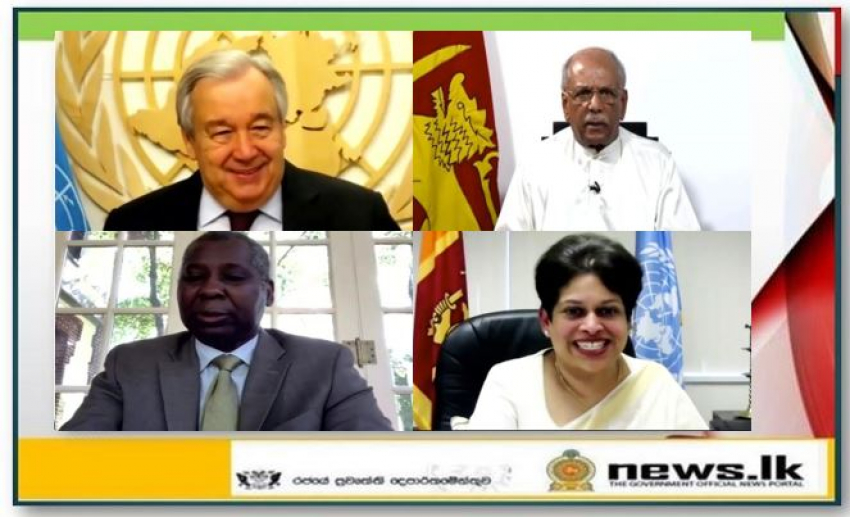The event, organized by the Permanent Missions of Sri Lanka and Thailand, featured a keynote message from Hon. Dinesh Gunawardena, Minister of Foreign Relations of Sri Lanka. Highlighting the value of Buddhism during this time of unprecedented global insecurity created by the pandemic, the Minister stated that the Buddha’s teachings could be a guide through this haze of uncertainty, towards light. He upheld that the practice of the four virtues of loving kindness, compassion,sympathetic joy and equanimity could ease the sufferings of mankind and generate trust and understanding. Minister Gunawardena outlined that the Dhamma is not only a religion but also a philosophy on the way of life, symbolized by a Path of Knowledge with its’ goal being the destruction of ignorance, characterized, among others, by the futility of the egoistic notion.
The Minister emphasizing that even after 2600 years that the Teachings are still sought for its intrinsic wisdom and values, continue to provide solace, comfort and tranquility to ensure peace of mind to humankind in this troubled modern world. He also paid tribute to Late Foreign Minister Lakshman Kadirgamar for his leading role in obtaining recognition for the Day of Vesak at the United Nations in 1999.
Ambassador Kshenuka Senewiratne, Permanent Representative of Sri Lanka to the United Nations in her opening remarks,referred to the teachings of the Buddha, being reflected in the objectives of the UN Charter, including the practicing of tolerance and living as good neighbours, maintenance of global peace and security and achieving economic and social development. Emphasizing the need to arrest the erosion of multilateralism, she pointed out the relevance of the Buddhist doctrine grounded on the principle of equality for all, regardless of status or circumstances, which resonates in the UN tenets of sovereign equality and inclusivity of all nations. Stressing that the consequences of the pandemic have further exacerbated the ceaseless suffering of mankind, she urged that countries must unite to build in a spirit of cooperation, compassion and equality, a peaceful and prosperous world.
The Secretary General of the United Nations, Antonio Guterres observed that the Buddha’s message of solidarity and service to others is more important than ever, as it reminds of the need for unity to combat the pandemic. He highlighted that international co-operation, especially through the combining of energies and expertise, could ease the economic and social consequence of the current crisis and build a healthier, more inclusive, sustainable, resilient and equitable world. He concluded that the sense of a shared fate and collective compassion, both encapsulate the spirit of the Buddha and the animating force of the UN Charter, which celebrates its 75th anniversary this year.
Elaborating on the severity of the current global pandemic, the President of the General Assembly, Tijjani Muhammed Bande, remarked that the world was facing a global health crisis unlike any other, experienced during the 75 years of the United Nations, adding that it is during these times of great anxiety that faith can be a significant source of comfort and community resilience. He observed that this commemorative event served to remind people of the importance of tolerance, mutual respect and understanding that are enshrined in the teachings of the Buddha, which are the same values that the UN has been promoting and advancing throughout the world,that will enthrone peaceful co-existence in diversity.
The occasion also featured blessings in the Theravada tradition by venerable monks of the New York Buddhist Vihara, who chanted excerpts of the “Ratana Sutta” together with blessings, to alleviate the suffering and fears of people during this time of a global pandemic. Blessings in the Mahayana tradition were also conducted by venerable monks from China, Japan and Korea of the Buddhist Council of New York and the American Buddhist Confederation. In his sermon, Ven. Dr. Bellanwila Dhammaratana Nayake Thero, Chief Incumbent of the Bellanwila Raja Maha Vihara and Advisor to the Buddhist Library in Singapore highlighted the concept of equality and inclusion in the teachings of the Buddha,
which promoted equal opportunities for men and women, Brahmins and outcasts, the rich and the poor alike, to pursue the path of enlightenment. Ven. Dr. Phra Anil Sakya, Deputy Rector, Mahamakut Buddhist University of Thailand, in his sermon highlighted that the Buddha’s teachings encapsulated the importance of Sustainable Development, as advocated in the “Dhammachakkappavattana Sutta”.
Several Member States also spoke on the significance of Vesak, including the Permanent Representatives India, Nepal, Bangladesh, Bhutan, Cambodia, Indonesia, Japan, Lao PDR, Myanmar and Vietnam. In addition, Deputy Permanent Representatives and senior officials of the Philippines, Pakistan, Republic of Korea, the Russian Federation and Singapore also spoke during the commemorative event. Many of these countries elaborated on the historic Buddhist ties in their countries and contribution that Buddhism makes to global peace and solidarity and its relevance to coping with the challenges of modern life.
Permanent Mission of Sri Lanka to the United Nations
2nd July 2020




















